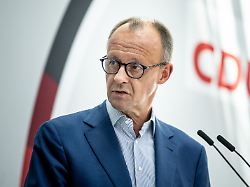CDU boss against party ban
Merz does not rule out municipal cooperation with AfD
7/23/2023 5:32 p.m
In the summer interview, CDU leader Merz acknowledges current weaknesses in his own party in view of the consistently good poll numbers for the AfD. At the same time, however, he affirmed that he does not believe that a ban on the party would be expedient, and the Union will not cooperate with the AfD – with exceptions.
The CDU chairman Friedrich Merz has rejected a ban on the AfD, which is steadily increasing in the polls. “Party bans have never led to solving a political problem,” he said in the ZDF summer interview. The parliamentary group leader called a corresponding proposal by the CDU member of the Bundestag Marko Wanderwitz in the past few days “an individual opinion in the parliamentary group that we do not share”.
Merz reiterated that the Union would not cooperate with the AfD. However, he limited this to “legislatures” and “government formations”. Local politics is different from state and federal politics. If the AfD has now elected a district administrator in Thuringia and a mayor in Saxony-Anhalt, then these are democratic elections, said Merz. “We have to accept that. And of course the local parliaments have to look for ways to shape the city, the state and the district together.”
When asked whether he was giving up a strict demarcation between the CDU and the AfD, Merz said: “I haven’t given up on that, but we are obliged to recognize democratic elections.” He also made it clear that the refusal referred to joint alliances at the federal or state level, and that the threat of party expulsion procedures for acting against this line remained. “At the municipal level, party politicization has progressed a bit too far anyway,” Merz continued.
Sharp criticism from SPD and Greens
SPD faction deputy Dirk Wiese criticized Merz’ statements sharply: “One year before the state elections in East Germany, Friedrich Merz’s statements are dismaying. He is tearing down the foundation of the Union’s firewall against the right,” he said “Sueddeutsche Zeitung”. “It looks like a free ticket for those in the CDU in the East who have always considered working together.”
“Instead of strengthening the unity of the democratic forces, the much-cited firewall against the AFD is obviously no longer clear,” wrote the Green Party leader, Britta Haßelmann Twitter. “Where is that supposed to lead, dear @CDU?!” She added.
The 2018 CDU decision states: “Germany’s CDU rejects coalitions and similar forms of cooperation with both the Left Party and the Alternative for Germany.” After the right-wing extremist murder of CDU politician Walter Lübcke, it was again stated in 2019: “The CDU rejects any coalition or similar forms of cooperation with the AfD. The CDU will use all available opportunities to enforce this decision.” Anyone in the CDU who advocates rapprochement or even cooperation with the AfD should know that they are approaching a party that consciously tolerates right-wing extremist ideas, anti-Semitism and racism in its ranks.
Municipalities were also included in a resolution from 2020: “We as the CDU are happy to take responsibility. In the municipalities, in the federal states and at federal level. But we conduct politics on the basis of values and convictions. And these exclude – for different reasons – cooperation with the AfD and the Left Party.”
“Don’t measure us against the AfD”
When asked what the AfD offers people and what the CDU doesn’t, Merz replied: “We don’t measure ourselves against the AfD, we’re the largest opposition faction in the German Bundestag, so we’re the alternative to this federal government.” In view of the consistently good poll numbers for the AfD, Merz acknowledged current weaknesses in his own party. The Union must now deliver concepts and regain trust. That is a difficult path. “We’ve been doing pretty well for a year and a half now. But we still have to improve.”
Merz once again took up a term that he had already used on Wednesday at the retreat of the CSU state group in Andechs Monastery in Upper Bavaria. At that time he called the Union the “alternative for Germany with substance”. He now said on ZDF that the opposition is always an alternative to the federal government. That’s how democracy is. “There is a government and of course there is an alternative to this government – for Germany. In Germany, for Germany.”
